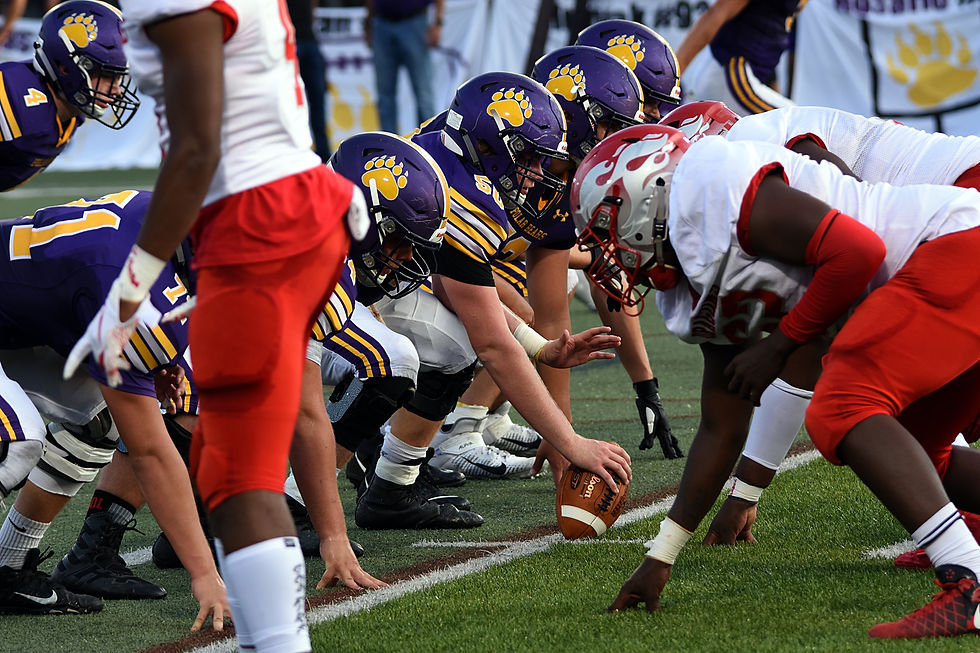Professional sports: Professional traumas and their impact on health
- Lauryn Agron
- Mar 26, 2022
- 4 min read
Updated: Mar 9, 2025

Professional sports deeply impact the health of athletes. Professional traumas are often experienced among professional athletes. The professional trauma athletes experience is through developing mental conditions. Many athletes are faced with sport-specific mental disorders like concussions and dementia pugilistica, doping, and anorexia athletica or overtraining. Even though athletes are at risk for various mental disorders, professional sports players are not protected against the development of many common mental conditions such as depression, anxiety, substance use disorders, eating disorders, or attention deficit-hyperactivity syndrome. According to Rice et al. (2019), 8.6% of elite athlete populations have anxiety. Depression is the most common mental health outcome among professional athletes. 70.4% of elite athletes from the United States and Canada have depression (Rice et al., 2017). In addition to emotional and mental traumas, physical traumas, like sports-related concussions, have been an increasing public health issue in the past 30 years. Symptoms from playing professional sports include getting concussions, headaches, dizziness, neck pain, exercise intolerance, cognitive problems, and noise or light sensitivity. Professional sports players experience these symptoms within a short time span, and the symptoms usually resolve within 7–10 days. However, 10-20% of athletes have experienced these symptoms for several weeks or several months (Ströhle, 2018).
Professional traumas also have harmful effects on the physical health of people who are involved in professional sports. According to Ströhle (2018), inefficient sleep is defined as having less than seven hours of sleep per night for a healthy adult. Surveys conducted by the National Collegiate Athletic Association (NCAA) to collegiate athletes produced results which showed over half of United States athletes regularly get insufficient sleep. 50% of American athletes report having less than 7 hours of sleep per night during their sports season, and 79% report 8 hours or less. 49% of elite athletes who are Olympic athletes experience multiple sleep problems (Ströhle, 2018).
Recently, college athletes have been at high-risk for reporting higher levels of anxiety and depression (Economou et al., 2021). The study by Ströhle (2018) concluded that athletes younger than 20 years old are at the highest risk for developing second impact syndrome. A second impact syndrome can be fatal when resulting from cerebral edema following a second concussion during incomplete regression of the first concussion (Ströhle, 2018).
Elite athletes need to take control of their mental health by gaining support from fellow athletes and professional sports organizations. In professional sports, there is a stigma that if one is tough, then one should be able to help themselves and don’t have to get help from others. Getting help for supporting elite athletes’ mental health can prevent future or further development of mental disorders. Professional sports players need to watch their sleeping patterns, irritability, and energy levels, as well as any changes in eating habits (Athletes and Mental Health: Breaking the Stigma, 2021). It is best to start the conversation of prioritizing mental health in athletes at a younger age. Creating a new mind space for professional athletes allows their overall health to improve, and that plays a significant role in the success of their athletic careers.
Professional athletes experience a lot of pressure from society. This pressure to do well can harm their mental health. Whether an athlete's trauma is from mental or physical traumas, getting the right kind of help and support is going to help them be a better, healthier player and person. The effects of professional trauma are more significant than the stigma of viewing athletes as people that do not have to reach out for help or support. Athletes in the world of professional sports are human. They are faced with so many pressures and play multiple roles. Those trying to maintain and better their mental health should not have to suffer in silence any longer. Hopefully, elite athletes do not have to suffer as much trauma and can better their overall health so they can have a successful career and life.
References:
Athletes and Mental Health: Breaking the Stigma. (2021, August 10). Cleveland Clinic. https://health.clevelandclinic.org/mental-health-in-athletes/.
Economou, P. J., Glascock, V., Louie, M., Poliakova, P., & Zuckerberg, W. (2021, October 20). COVID-19 and its impact on student-athlete depression and anxiety: the return to campus. The Sport Journal. https://thesportjournal.org/article/covid-19-and-its-impact-on-student-athlete-depression-and-anxiety-the-return-to-campus/.
Rice, S. M., Gwyther, K., Santesteban-Echarri, O., Baron, D., Gorczynski, P., Gouttebarge, V., Reardon, C. L., Hitchcock, M. E., Hainline, B., & Purcell, R. (2019). Determinants of anxiety in elite athletes: a systematic review and meta-analysis. British Journal of Sports Medicine, 53(11), 722–730. https://doi.org/10.1136/bjsports-2019-100620.
Rice, S. M., Parker, A. G., Rosenbaum, S., Bailey, A., Mawren, D., & Purcell, R. (2017). Sport-Related Concussion and Mental Health Outcomes in Elite Athletes: A Systematic Review. Sports Medicine, 48(2), 447–465. https://doi.org/10.1007/s40279-017-0810-3.
Ströhle, A. (2018). Sports psychiatry: mental health and mental disorders in athletes and exercise treatment of mental disorders. European Archives of Psychiatry and Clinical Neuroscience, 269(5), 485–498. https://doi.org/10.1007/s00406-018-0891-5.
Contributors:
Author: Dora Sow
Editor: Lauryn Agron
Health scientist: Dora Sow
_edited.jpg)



"Your examination of sports trauma hits close to home! As a kinesiology PhD candidate researching concussion protocols, I became so invested in athlete rehabilitation that my dissertation introduction stalled. Seeking dissertation introduction help online allowed me to properly frame my research on long-term neural impacts while continuing clinical work with injured players—sometimes supporting both academic rigor and athlete wellbeing requires strategic partnership."